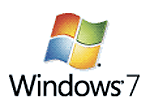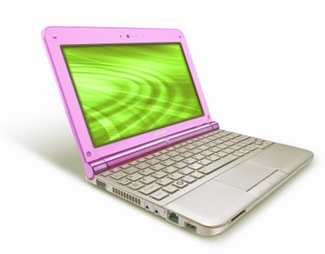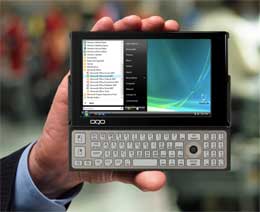 Netbooks aren’t just changing the world’s perceptions of how powerful a computer must be to be useful–they’re also having a major impact on Microsoft’s business model. They’re one reason why Windows XP refuses to die–even though the Wall Street Journal reported that Microsoft makes less than $15 per copy of XP installed on a netbook, versus $50 to $60 for a copy of Windows Vista.
Netbooks aren’t just changing the world’s perceptions of how powerful a computer must be to be useful–they’re also having a major impact on Microsoft’s business model. They’re one reason why Windows XP refuses to die–even though the Wall Street Journal reported that Microsoft makes less than $15 per copy of XP installed on a netbook, versus $50 to $60 for a copy of Windows Vista.
Things will only get more complicated when Windows 7 arrives. It’s designed to do what Windows Vista can’t: perform reasonably well on a modestly-equipped netbook. Microsoft surely hopes that its arrival will help nudge XP into overdue, well-earned retirement. But netbook manufacturers can’t make economic sense of putting a $50 copy of Windows 7 onto a $300 netbook. And Microsoft, understandably, has no desire to sell them a $15 copy of full-blown Windows 7, thereby destroying its ability to sell a $50 one for use on fancier, pricier computers.
Enter Windows 7 Starter Edition, the version that Microsoft plans to pitch for use on low-cost netbooks. It’s got one limitation, but it’s a doozy: It only runs three applications at a time. Which sounds like it would make it useful only for clueless newbies and other folks whose needs are really, really undemanding.
Over at ZDNet, Ed Bott has a revealing post up based on having spent three weeks using Starter Edition, an experience that left him relatively positive about the product. He points out that there are multiple exceptions to the three-app limit: Windows Explorer windows, Gadgets, anti-virus apps that run as separate services, Control Panel utilities, and other items don’t count. Neither do multiple windows and multiple tabs opened up from a single application, such as your Web browser. The bottom line: Depending on what the items in question are, you may be able to have a lot more than three of them open without running into a message telling you that you must save your work and close an app before you can launch another one.
“In short, when I used this system as a netbook, it worked just fine,” Ed writes. “On a netbook, most of the tasks you’re likely to tackle are going to take place in a browser window anyway…If I tried to use this system as a conventional notebook, running multiple Microsoft Office or OpenOffice aps, playing music in iTunes or Windows Media Player, and using third-party IM programs, I would probably be incredibly frustrated with the limitations of Starter Edition.”
Which brings up an interesting question: Are netbooks really netbooks? By which I mean, are they designed primarily to let you use Web-based apps, and are they a distinct class of computer from traditional notebooks?
As of this very moment, you can make the case that the answer to both questions is yes. I’m thinking that the distinctions are going to vanish rapidly, though. A netbook is just a notebook that happens to be small and cheap–and the definitions of both “small” and “cheap” are blurring. Dell, for instance, sells a Mini netbook with a not-tiny 12-inch screen. And the existence of cheap netbooks is driving down the cost of notebooks, period: Best Buy, for instance, already sells multiple traditional notebooks in the netbook-like neighborhood of $400 or so. I don’t think every notebook will look like today’s netbooks, but I think the trend will be towards smaller, lighter models (especially as features like optical drives go away) that cost less than a thousand bucks.
Do people use netbooks mostly for Web-based apps? I may try to find out via a survey, but for the moment I can speak only for myself: I do a lot of Web stuff on my Asus Eee PC 1000HE, but I also use old-fashioned software–Web browsers, Skype, Paint.NET, Adobe Acrobat, and more. I suspect I’d run afoul of Windows 7 Starter Edition’s limitations…well, not constantly, but frequently. Then again, I’d be willing to pay for an upgrade to a version of Windows 7 without the three-app limit–and I’m already curious about how much such an upgrade might cost.
All of which leaves me thinking that Microsoft is still in a tough spot that will only get tougher over time: As notebooks get dirt cheap, it’s going to be incredibly difficult for it to maintain the profit margins that Windows has enjoyed for the past couple of decades. And if it doesn’t come up with a low-cost version of Windows that a reasonable person won’t find to be unreasonably crippled, it gives Linux a great big opportunity to grab the market share that so far has eluded it.
Of course, anything anyone says right now about Windows 7 Starter Edition the future of netbooks is speculation. When Windows 7 ships in a few months–on netbooks that will deliver more power at a given price point than today’s models–we’ll get to see what real people think about all this.
 The PC industry may continue to be a tad uneasy with the popularity of netbooks, but there’s no question that the little guys are selling well–and not just to folks on tight budgets. Enter HP’s latest and most lavish netbook, the Mini 5101, which the company just announced. Aimed at business types, the 5101’s pricetag starts at $449 and goes up from there–which is striking in a category where most models max out at $400 or less.
The PC industry may continue to be a tad uneasy with the popularity of netbooks, but there’s no question that the little guys are selling well–and not just to folks on tight budgets. Enter HP’s latest and most lavish netbook, the Mini 5101, which the company just announced. Aimed at business types, the 5101’s pricetag starts at $449 and goes up from there–which is striking in a category where most models max out at $400 or less.
 Of all the news that came out of Monday’s Apple WWDC keynote, one tidbit that didn’t get much attention is worthy of note: Apple’s refresh of its 13-inch laptop brought back the FireWire port that
Of all the news that came out of Monday’s Apple WWDC keynote, one tidbit that didn’t get much attention is worthy of note: Apple’s refresh of its 13-inch laptop brought back the FireWire port that  Quick, you guys: Quit your jobs, team up with each other, and form a research firm specializing in Apple punditry. As a group, your predictions would likely be significantly closer to being on-target than those of a bunch of well-known analyst firms where serious moolah is made guessing what Steve Jobs and company are working on.
Quick, you guys: Quit your jobs, team up with each other, and form a research firm specializing in Apple punditry. As a group, your predictions would likely be significantly closer to being on-target than those of a bunch of well-known analyst firms where serious moolah is made guessing what Steve Jobs and company are working on. Toshiba has been just about the only significant PC manufacturer who hasn’t jumped on the netbook bandwagon in the U.S. market. Until today, that is–the company is announcing the Mini NB205, its first small, low-cost laptop. (Toshiba prefers to call these mini notebooks, not netbooks; I don’t know if the
Toshiba has been just about the only significant PC manufacturer who hasn’t jumped on the netbook bandwagon in the U.S. market. Until today, that is–the company is announcing the Mini NB205, its first small, low-cost laptop. (Toshiba prefers to call these mini notebooks, not netbooks; I don’t know if the  The personal computer revolution is roughly thirty-five years old, which means that been through seven half-decades so far. To me, the most interesting one is the first half of the 1980s–when PCs were really getting going, and hadn’t yet become commodified through compatibility. Almost every new one was an experiment, whether it was wildly successful or a flop.
The personal computer revolution is roughly thirty-five years old, which means that been through seven half-decades so far. To me, the most interesting one is the first half of the 1980s–when PCs were really getting going, and hadn’t yet become commodified through compatibility. Almost every new one was an experiment, whether it was wildly successful or a flop. The first few years of PC history were its stone age–the era when any signs of life whatsoever were history-making. The period from 1985 to the present, as amazing as it’s been, has been one of consistency and compatibility. Which is why I think of 1980-1985 as the most interesting half-decade in PC history. Almost every new system (including some that debuted in 1979) was still an experiment–and even flops could be fascinating. Herewith a gallery of notable examples, illustrated with evocative drawings from
The first few years of PC history were its stone age–the era when any signs of life whatsoever were history-making. The period from 1985 to the present, as amazing as it’s been, has been one of consistency and compatibility. Which is why I think of 1980-1985 as the most interesting half-decade in PC history. Almost every new system (including some that debuted in 1979) was still an experiment–and even flops could be fascinating. Herewith a gallery of notable examples, illustrated with evocative drawings from Things don’t look good for OQO, the company behind a series of handheld computers that ran full-blown Windows. As
Things don’t look good for OQO, the company behind a series of handheld computers that ran full-blown Windows. As  Got a moment to get all nostalgic over old electronic equipment? Over on Twitter–where I’m
Got a moment to get all nostalgic over old electronic equipment? Over on Twitter–where I’m  Netbooks aren’t just changing the world’s perceptions of how powerful a computer must be to be useful–they’re also having a major impact on Microsoft’s business model. They’re one reason why Windows XP refuses to die–even though the Wall Street Journal reported that
Netbooks aren’t just changing the world’s perceptions of how powerful a computer must be to be useful–they’re also having a major impact on Microsoft’s business model. They’re one reason why Windows XP refuses to die–even though the Wall Street Journal reported that